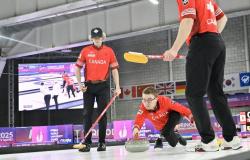
Among seniors, impaired motor control, cognitive or sleep disorders are common ailments. A team from Friborg shows that training your balance helps counter one of the neurological dysfunctions at the origin of these pathologies.
Scientists led by Yves-Alain Kuhn and Wolfgang Taube, from the University of Friborg (UNIFR), looked at a neurotransmitter, gamma-aminobutyric acid (GABA). Its role is to prevent certain nervous messages from going too far or too strongly. It acts as a sort of brake allowing the brain to avoid an overload of activities.
This role of brake, which acts in the motor cortex, in other words in the area which controls movements, is known as intracortical GABAergic inhibition.
“With age, this inhibition works less well,” explains Yves-Alain Kuhn, quoted Wednesday in a UNIFR press release. It is this dysfunction which is at the origin, among other things, of balance disorders and loss of motor control in seniors.
Interestingly, in children too, this inhibition is naturally less developed, which sometimes contributes to more disordered movements at the beginning of learning. This capacity for inhibition reaches its peak in adulthood, then gradually declines over time.
Effective exercises
To carry out their studyscientists split 40 people aged between 66 and 81 into two groups. In the first, twenty seniors followed balance training exercises in two one-hour sessions per week, while the second served as a control group.
-The seniors in the first group had to perform increasingly difficult exercises, for example walking on an unstable surface such as cushions, or on an oscillating board or even a slackline.
After six months, the team of scientists observed a significant improvement in intracortical inhibition (+16.5%) and balance performance (+15%) in the first group compared to the second.
“We were thus able to demonstrate, and this for the first time, that healthy elderly people are capable of acting on this famous age-related decline in intracortical inhibition, a process which therefore has nothing to do with it. “inevitable”, rejoices the researcher. Physical activity can therefore be a powerful tool to restore the balance between excitatory and inhibitory neurotransmitters, even in old age. German scientists also contributed to this work published in The Journal of Physiology.
ats/ther
Health





